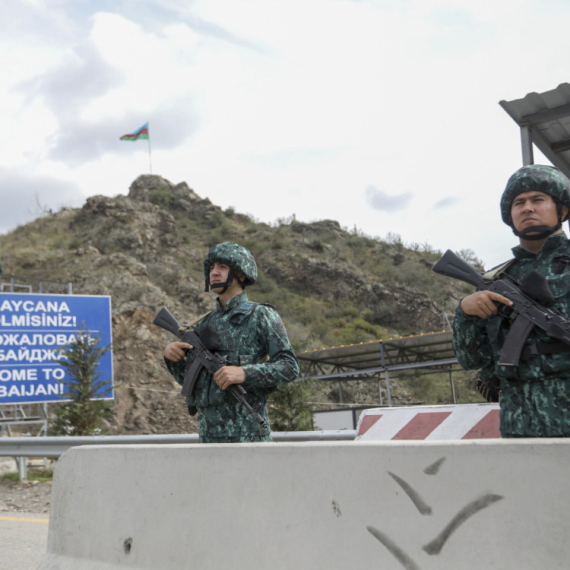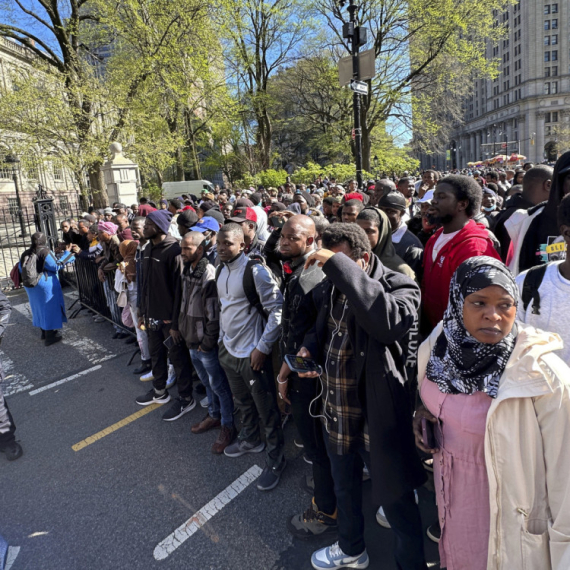"Brussels made mistake in December"
A Washington-based Woodrow Wilson Center expert for the Balkans says Brussels made a mistake in not giving Serbia EU candidate status in December.
Wednesday, 11.01.2012.
15:20

A Washington-based Woodrow Wilson Center expert for the Balkans says Brussels made a mistake in not giving Serbia EU candidate status in December. Stopping Serbia on its European path, especially for an extended period, is not good for Serbia, for the region or for Europe, and I think even the biggest opponents of candidacy see this now, as does Washington, Martin Sletzinger told Belgrade daily Vecernje Novosti. "Brussels made mistake in December" He noted that tensions in northern Kosovo ahead of the decision date and the economic crisis in Europe certainly did not work to Serbia's advantage. But all of this was actually an alibi for stopping Serbia on its European path. For a long time it was the Netherlands and the condition of cooperating with the International Criminal Tribunal for the former Yugoslavia, and now it is Germany with it demands regarding Kosovo, because it does not want another country with problems in the European family, Sletzinger said. Asked about the accuracy of the claims that the United States is the one pressuring Germany to take a hard line on Serbia's candidacy bid, in order to force Belgrade to be more cooperative in solving the Kosovo issue, Sletzinger said it is no secret Washington worked together closely with Berlin during the 1990s and the events in the former Yugoslavia. The U.S. and Germany were the two key countries in the process. Germany has had poor relations with Serbia since the start of the breakup of the Socialist Federal Republic of Yugoslavia, and they have not been fully normalized to this day. Berlin was the first to recognize the independence of Croatia and Slovenia, which was a mistake in my opinion, he said. According to him, there are still people high in the U.S. administration who believe Serbia has not been sufficiently punished for everything that went down in the Balkans, but that above all, the U.S. cares about peace and stability in the region, because it has enough on its plate with Iraq and Afghanistan and does not want another conflict zone. "Also, the U.S. is concerned about the rise of anti-European powers in Serbia, who benefit from the decision to withhold the candidacy. That is why the U.S. is now trying to pressure Berlin into relenting," Sletzinger said. He believes the U.S. recognition of Kosovo was definitely a mistake. If we already consented to changing the Serbian border, we also should have left the option open for Kosovo itself, because it could be a good solution, Sletzinger said. Tanjug Vecernje novosti
"Brussels made mistake in December"
He noted that tensions in northern Kosovo ahead of the decision date and the economic crisis in Europe certainly did not work to Serbia's advantage.But all of this was actually an alibi for stopping Serbia on its European path. For a long time it was the Netherlands and the condition of cooperating with the International Criminal Tribunal for the former Yugoslavia, and now it is Germany with it demands regarding Kosovo, because it does not want another country with problems in the European family, Sletzinger said.
Asked about the accuracy of the claims that the United States is the one pressuring Germany to take a hard line on Serbia's candidacy bid, in order to force Belgrade to be more cooperative in solving the Kosovo issue, Sletzinger said it is no secret Washington worked together closely with Berlin during the 1990s and the events in the former Yugoslavia.
The U.S. and Germany were the two key countries in the process. Germany has had poor relations with Serbia since the start of the breakup of the Socialist Federal Republic of Yugoslavia, and they have not been fully normalized to this day. Berlin was the first to recognize the independence of Croatia and Slovenia, which was a mistake in my opinion, he said.
According to him, there are still people high in the U.S. administration who believe Serbia has not been sufficiently punished for everything that went down in the Balkans, but that above all, the U.S. cares about peace and stability in the region, because it has enough on its plate with Iraq and Afghanistan and does not want another conflict zone.
"Also, the U.S. is concerned about the rise of anti-European powers in Serbia, who benefit from the decision to withhold the candidacy. That is why the U.S. is now trying to pressure Berlin into relenting," Sletzinger said.
He believes the U.S. recognition of Kosovo was definitely a mistake.
If we already consented to changing the Serbian border, we also should have left the option open for Kosovo itself, because it could be a good solution, Sletzinger said.





















































Komentari 10
Pogledaj komentare